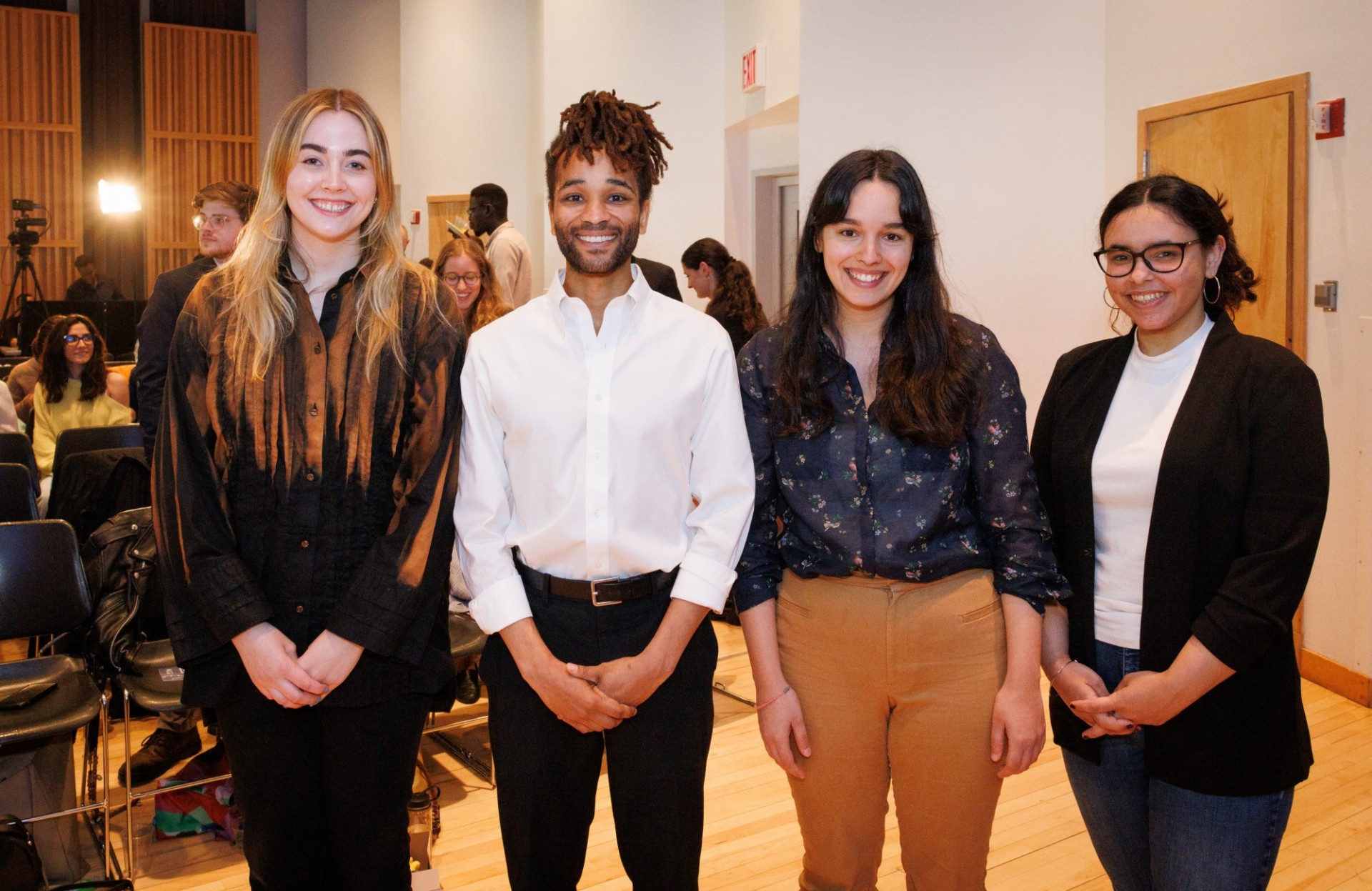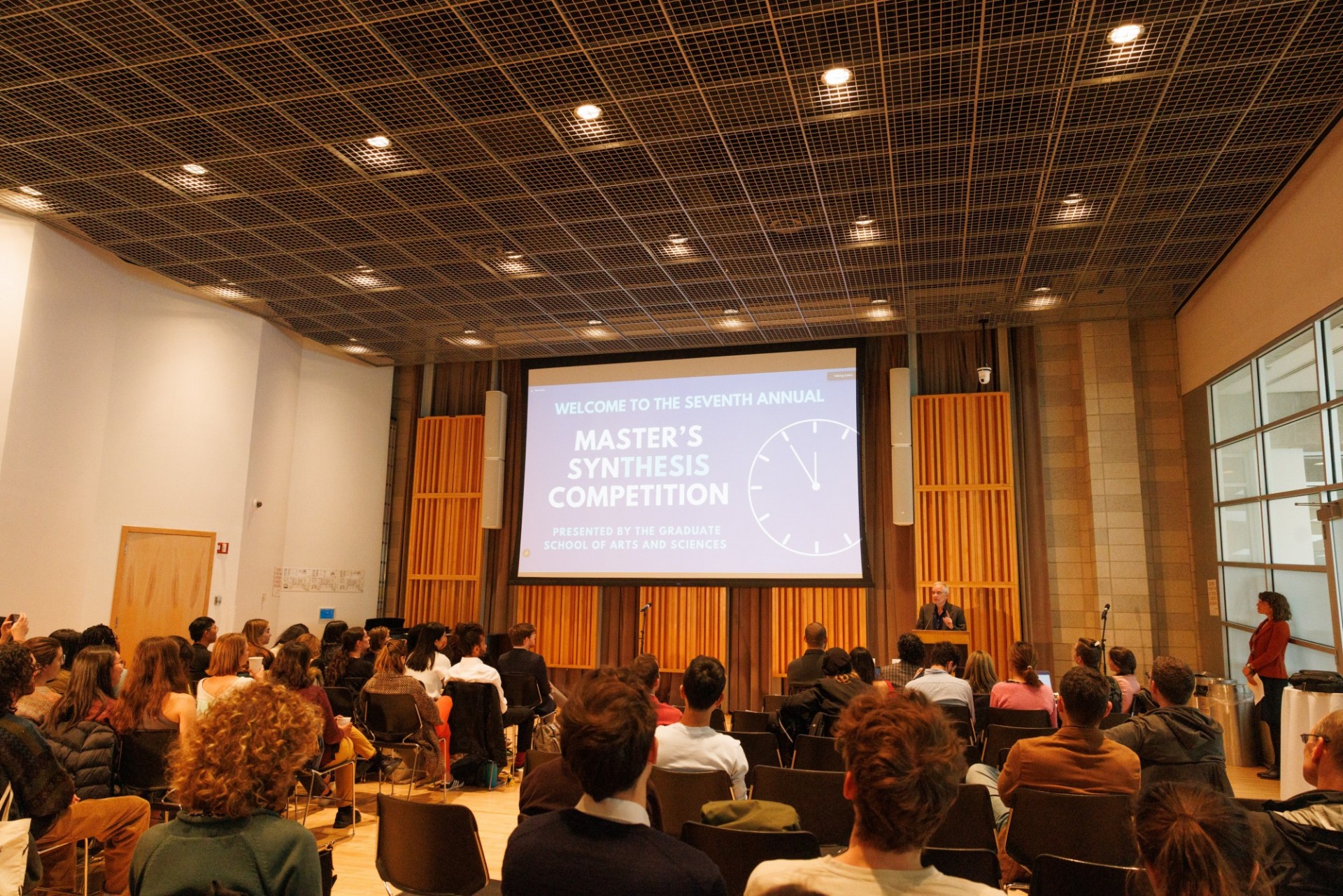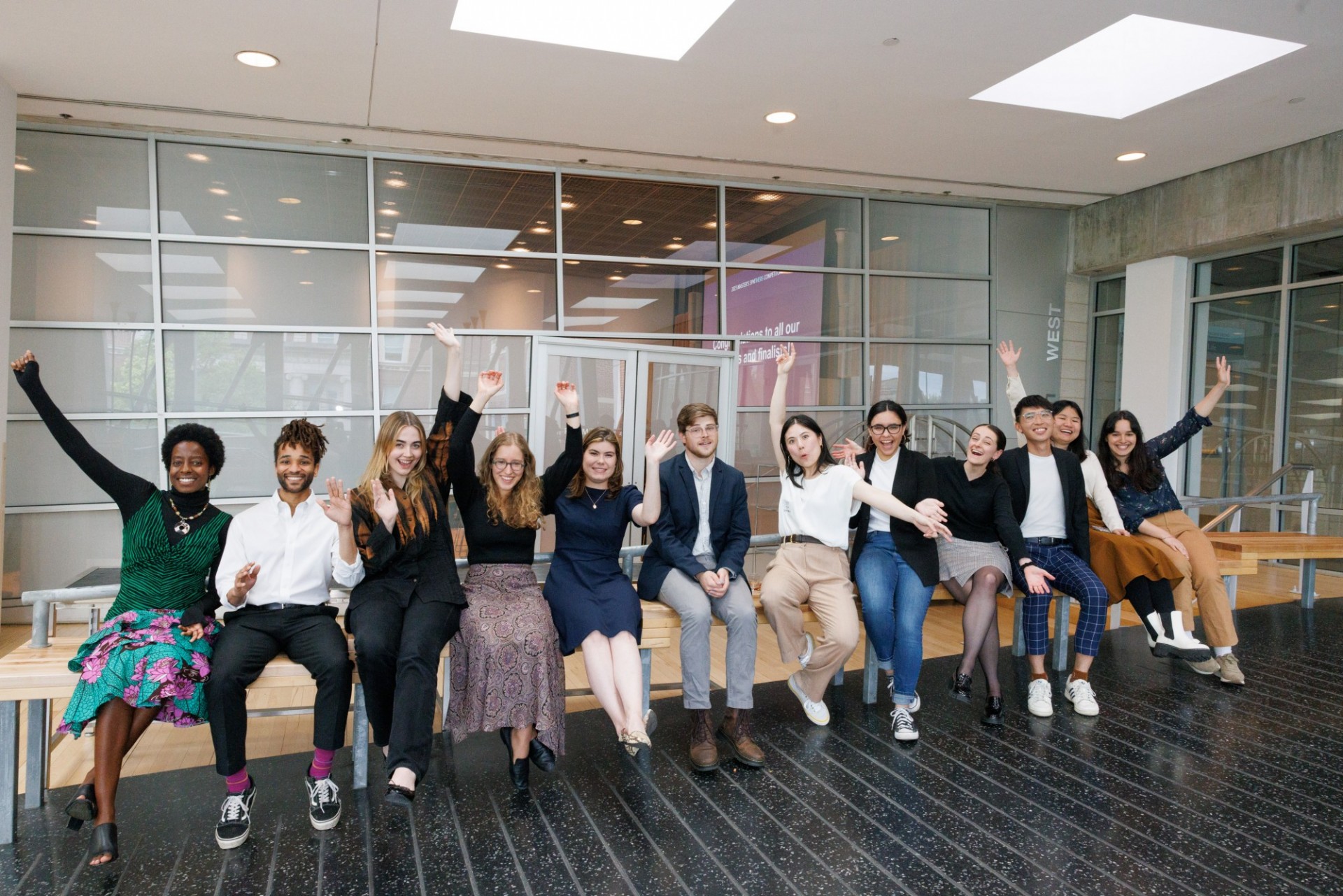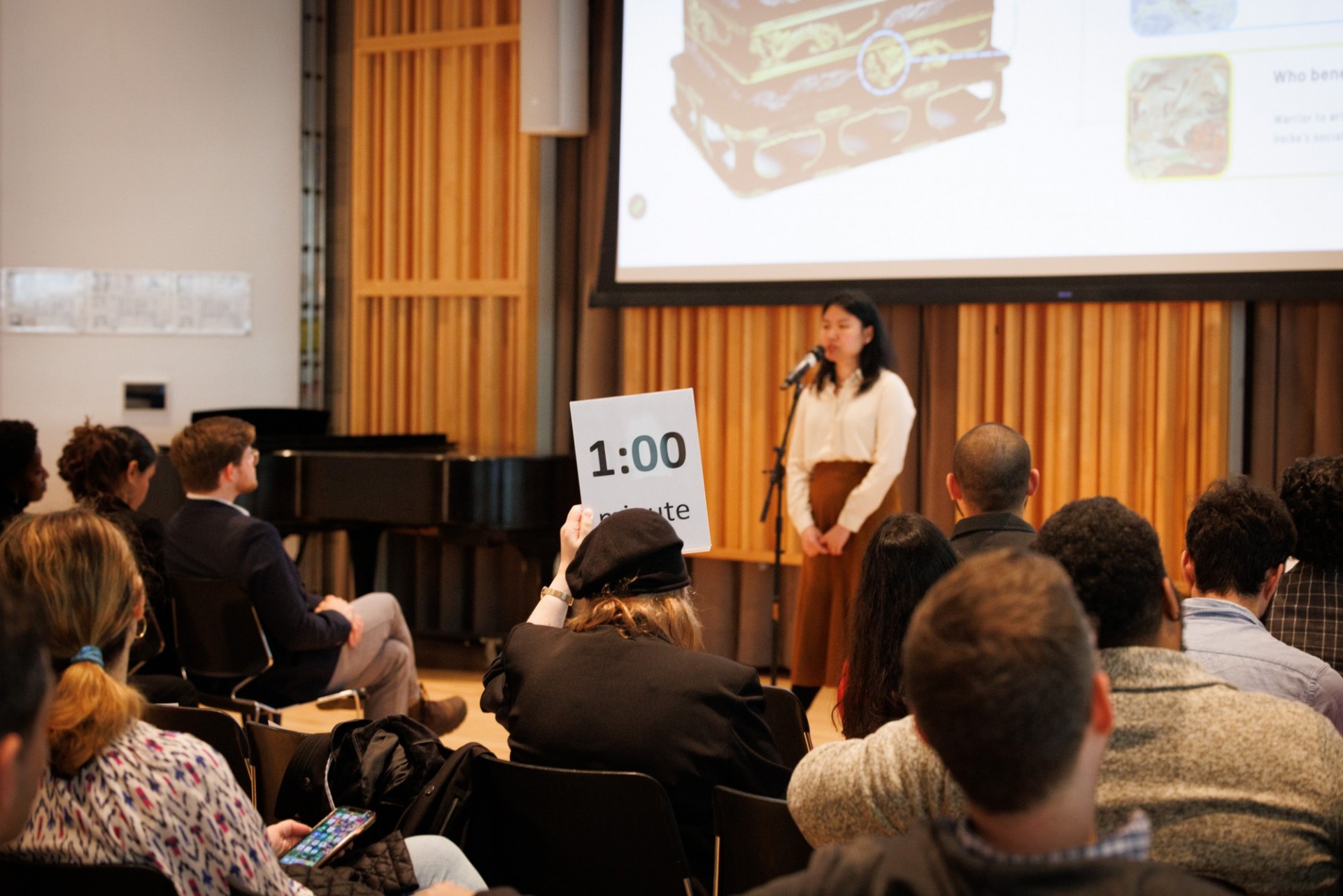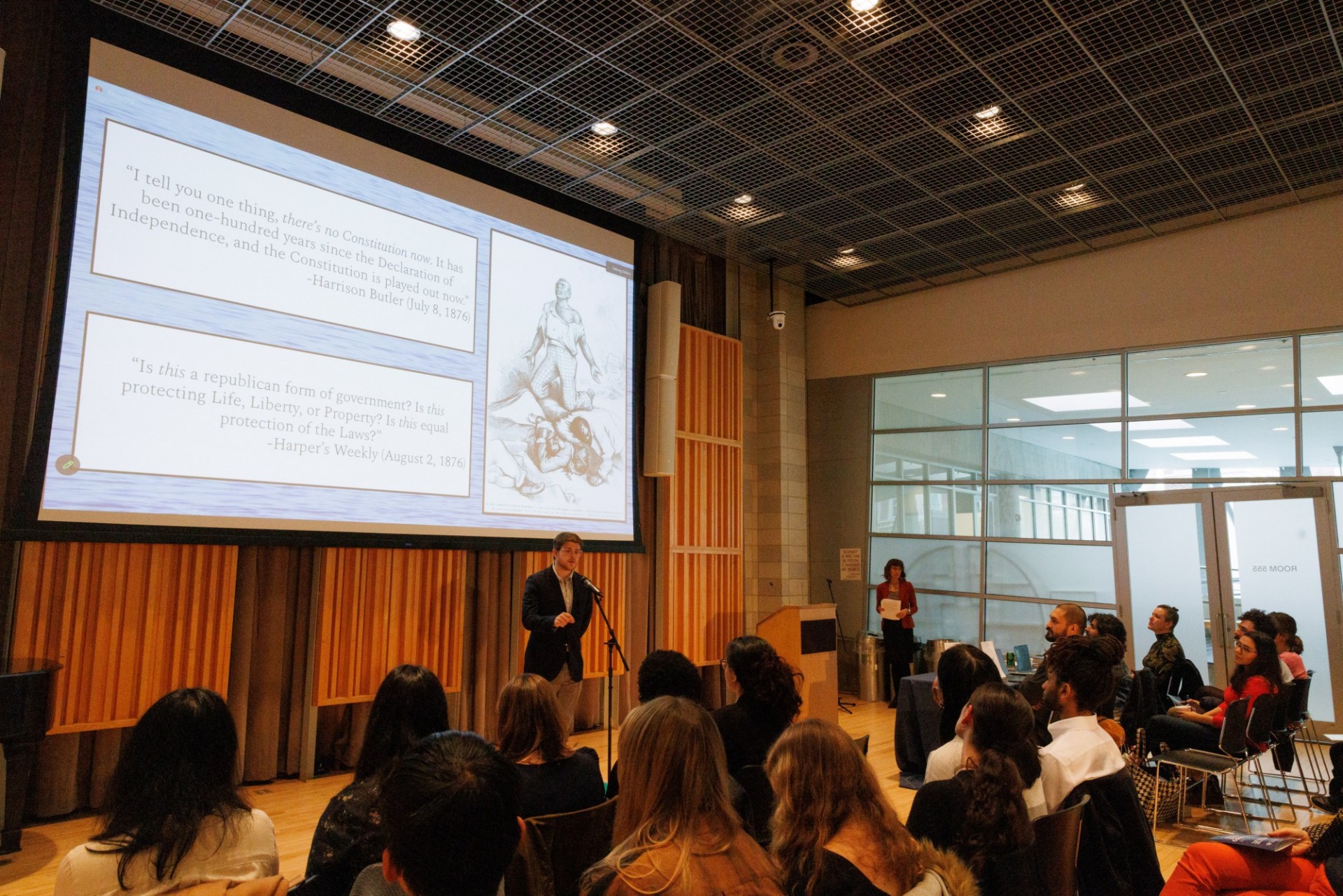To the Point: GSAS Students Present Their Research in the Seventh Annual Master’s SynThesis Competition
Imagine taking a topic that you’ve been researching and thinking about for over a year, and presenting it to the general public in a three-minute talk, with just one visual slide and no notes to help you. On May 2, 2023, twelve Columbia GSAS Master’s students did exactly that. After dozens of MA candidates submitted “SynThesis” proposals, twelve finalists came ready to face the timer – and each other. Representing work from across the GSAS departments, their three-minute-thesis subjects ranged from the treatment of Italian immigrants in the United States, to a court case in China, to automated language programs such as ChatGPT and how they can expand their learning.
The event was organized by Rachel Bernard and Francesca Fanelli of the GSAS Compass career development office. The room was filled with students, friends, staff, and professors – including a panel of faculty and alumni judges. Online viewers tuned in from around the world. Host Rachel Bernard welcomed all, and Dean Carlos Alonso kicked off the event with words of encouragement, “To the twelve finalists: you exemplify the range and depth of graduate student research at Columbia, as well as the University’s mission not just to advance knowledge and learning at the highest level, but to convey the products of your efforts to the wider community. Good luck with your presentations! You got this!”
One after another, the finalists presented their thesis material distilled to the essentials, like an elevator pitch or a mini TED talk. Cindy Chen used charts to illustrate racial and economic inequality in the setting of bail bonds by New York judges. Ornella Baganizi showed photographs of family members in Rwanda, as part of a larger oral history project about life before and after the 1994 genocide. Darcy Olmstead presented photos from her visit to an art piece titled “Future Library,” a forest in Norway that is to be harvested to make books in 100 years. Jack West described the rise of white supremacy in post-Civil War South Carolina. Myles Davis spoke about wildlife in the green spaces of New York City, and how patterns of movement changed during the pandemic. Laetitia Maurat talked about the use of citizen videos in the international criminal courts. At only three minutes apiece, the presentations flew by.
While the judges scores were tallied, spectators – both in-person and online – sent in votes for the audience favorite award. The finalists got a moment to breathe and compare notes. “I feel nervous and relieved,” said Xiaoke Yang, who gave a talk about the symbolic decorations on a sacred Japanese box. She found it liberating to edit down her thesis. “It gave me more freedom, talking to a general audience.” And Yang welcomed the public speaking practice: “I’m thinking of becoming a professor.”
After the break, Bernard announced the results. The Audience Choice winner was Brooke Helmick, from the Human Rights Studies program, who explained how the rise of extremist and hate organizations affects social wellness. The first-place winner (with $1000 prize) was Belén Hípola. Her SynThesis talk was about the high rates of school retention (holding students back a grade) in Brazil and its effects on academic success. “People don’t even know about this issue,” said Hípola. “In my country, Spain, grade retention is 28% of students. In Brazil it’s even higher: 34%. It’s a policy we can change.” Hípola seemed a little surprised that she won the competition. “Normally, I’m a bit shy. I wanted to practice these skills and overcome my shyness.” She said she might use her prize money to travel before beginning her PhD in Economics this fall in Milan, Italy.
Second-place winner (with $500 prize) was Darcy Olmstead, whose talk focused on the “Future Library” art project by Katie Paterson. “It’s a commentary on a world of speed and hyper-culture in the digital age.” Olmstead said she tried to make her presentation more conversational, “since I’m not good at memorizing.” She found it refreshing to hear from other SynThesis presenters, “They were all so good. It was great to see what other people are doing, great to connect to other students at GSAS.” Olmstead said she plans to use her prize money to help design and publish an actual book of her thesis. But first, she needed to attend to her thesis in its current form. “I’m turning it in tomorrow.”
In third place (with $250 prize), was Myles Davis, who spoke about human and wildlife activity in NYC during COVID. How did it feel to give a SynThesis talk? “I was nervous,” said Davis, “Having a mic in front of me is new. Plus it’s a competition.” But he credited the power of his overhead slide. “My project is visual. Cameras are my tool to collect data. I had an interesting map and cute animals on my side.” Davis said he might use the prize money to get summer clothes for his new job. “I accepted a position at the NYC Audubon, monitoring wildlife in green spaces and on rooftops. It starts in a few weeks.”
To see the SynThesis presentations, watch them on YouTube.
Finalists
Ornella Baganizi (Oral History)
Cindy Chen (Quantitative Methods in the Social Sciences)
Myles Davis (Ecology, Evolution, and Conservation Biology)
Melissa Feeney (Quantitative Methods in Social Sciences)
Brooke Helmick (Human Rights Studies)
Belén Hípola (Economics)
Maryjane Johnson (International and World History)
Laetitia Maurat (Global Thought)
Darcy Olmstead (Modern and Contemporary Art: Critical and Curatorial Studies)
Kar Lok Pang (East Asian Regional Studies)
Jack West (American Studies)
Xiaoke Yang (East Asian Languages and Culture)

